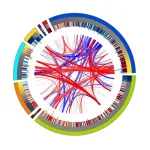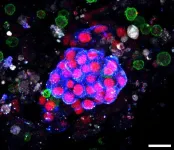(Press-News.org) According to the National Institutes of Health, approximately 24% of adults in the United States have nonalcoholic fatty liver disease (NAFLD), an umbrella term for a range of liver conditions affecting people who drink little to no alcohol that can lead to cirrhosis, liver cancer and liver failure.
Currently, there are no medications approved by the U.S. Food and Drug Administration (FDA) to treat NAFLD.
A recent $9.57 million grant awarded to researchers with the UC San Diego NAFLD Research Center at University of California San Diego School of Medicine will support a clinical trial to study a new treatment option for patients with the disease.
“Liver disease is a silent killer, and most people do not know they have a liver problem until it is advanced to cirrhosis because there are no obvious symptoms,” said Rohit Loomba, MD, chief of the Division of Gastroenterology and Hepatology and director of the NAFLD Research Center at UC San Diego School of Medicine. “The results from our study could have a global impact on clinical care for patients with NAFLD and other chronic liver diseases.”
Known as the SAMARA Study, the clinical trial will examine if an FDA-approved medication called semaglutide, which is commonly used for the treatment of type 2 diabetes and obesity, could be a promising treatment option for patients with liver scarring caused by NAFLD.
Semaglutide belongs to a class of medications known as glucagon-like, peptide-1 receptor agonist (GLP-1 RA) that mimics the GLP-1 hormone released in the body’s gut in response to eating.
The randomized clinical trial will include 120 participants diagnosed with type 2 diabetes and obesity, who will either inject the drug or a placebo. Participants will administer the injection once a week and will follow a dose escalation schedule over a period of 16 weeks until they reach 2.4 mg weekly.
The participants will be screened with routine blood work and undergo a test for liver stiffness and liver fat using an ultrasound-based device in the patient’s primary care doctor’s office.
“Unlike other similar trials for NAFLD, the SAMARA Study is the first of its kind in that it will be screening patients for eligibility using non-invasive methods that are applicable and practical in real-world, primary care settings,” added Loomba, gastroenterologist and hepatologist at UC San Diego Health. “By doing this in the primary care doctor’s office, we are hopeful this will provide an improvement in the detection and care for patients.”
NAFLD and NASH — otherwise known as nonalcoholic steatohepatitis, is the most severe form of NAFLD and consists of excessive fat build up in the liver. Individuals who are overweight, have type 2 diabetes or have a family member with NAFLD are at a higher risk of developing the disease.
According to Loomba, it’s anticipated that NAFLD will be the leading cause of liver transplantation in the United States by 2030, with type 2 diabetes and obesity being major risk factors for significant liver fibrosis due to NAFLD.
“Being awarded this grant represents an important step toward engaging populations in research, science and medicine to improve the health of individuals currently living with NAFLD,” said Loomba.
SAMARA is short for the full name of the clinical trial: Semaglutide treatment in the real-world for fibrosis due to NAFLD in obesity and type 2 diabetes mellitus.
Currently open at UC San Diego Health, an additional trial site is expected to open through a federally qualified health center that operates clinics in the Vista and Riverside counties to enable underserved populations to participate in the study.
Upon completion of the SAMARA Study, the next steps will be conducting a larger, multicenter, international trial.
UC San Diego Health ranked No. 1 in San Diego in the 2023-2024 U.S. News & World Report “Best Hospitals” survey and was placed on the "Best Hospitals National Honor Roll," a distinction awarded to only 22 hospitals nationwide. Gastroenterology & GI Surgery ranked top 20 in the nation for gastroenterology care and surgery.
# # #
END
Clinical trial studying possible new treatment option for patients with NAFLD
$9 million grant supports new study of utilizing semaglutide for liver disease
2023-08-23
ELSE PRESS RELEASES FROM THIS DATE:
National estimates of gender-affirming surgery
2023-08-23
About The Study: In this study of 48,000 patients, gender-affirming surgery increased significantly in the U.S., nearly tripling from 2016 to 2019. Breast and chest surgery was the most common class of procedures performed overall. The number of genital surgical procedures performed increased with increasing age.
Authors: Jason D. Wright, M.D., of the Columbia University College of Physicians and Surgeons in New York, is the corresponding author.
To access the embargoed study: Visit our For The Media website at this link https://media.jamanetwork.com/
(doi:10.1001/jamanetworkopen.2023.30348)
Editor’s ...
Health claims and doses of fish oil supplements
2023-08-23
About The Study: The results of this study suggest that the majority of fish oil supplement labels make health claims, usually in the form of structure/function claims, that imply a health benefit across a variety of organ systems despite a lack of trial data showing efficacy. Significant heterogeneity exists in the daily dose of eicosapentaenoic acid + docosahexaenoic acid in available supplements, leading to potential variability in safety and efficacy between supplements.
Authors: Ann Marie Navar, M.D., ...
Study: Atmospheric circulation weakens following volcanic eruptions
2023-08-23
The Pacific Ocean covers 32% of Earth’s surface area, more than all the land combined. Unsurprisingly, its activity affects conditions around the globe.
Periodic variations in the ocean’s water temperature and winds, called the El Niño–Southern Oscillation, are a major meteorologic force. Scientists know that human activity is affecting this system, but are still determining the extent. A new study in Nature has revealed that the atmospheric component of this system — ...
How artificial intelligence gave a paralyzed woman her voice back
2023-08-23
Researchers at UC San Francisco and UC Berkeley have developed a brain-computer interface (BCI) that has enabled a woman with severe paralysis from a brainstem stroke to speak through a digital avatar.
It is the first time that either speech or facial expressions have been synthesized from brain signals. The system can also decode these signals into text at nearly 80 words per minute, a vast improvement over commercially available technology.
Edward Chang, MD, chair of neurological surgery at UCSF, who has worked on the technology, known as a brain computer interface, or BCI, for more than a decade, hopes this latest research breakthrough, appearing Aug. 23, 2023, ...
Wildlife overflow enriches biodiversity beyond park boundaries
2023-08-23
New research has discovered the power of large national parks to not only enhance bird diversity inside their borders but boost mammal diversity in nearby unprotected areas.
The University of Queensland’s Dr Matthew Luskin said the study, which involved using more than 2,000 cameras and bird surveys across Southeast Asia, reveals for the first time the benefit of expanding protected land areas around the globe beyond park boundaries.
“Protected area expansions are often a difficult and expensive process, but our results show they are absolutely worth it,” Dr Luskin said.
“We ...
Graphene: More magic starts when flatness ends
2023-08-23
Researchers from The University of Manchester and the University of Warwick finally solved the long-standing puzzle of why graphene is so much more permeable to protons than expected by theory.
A decade ago, scientists at The University of Manchester demonstrated that graphene is permeable to protons, nuclei of hydrogen atoms. The unexpected result started a debate in the community because theory predicted that it would take billions of years for a proton to permeate through graphene’s dense crystalline structure. This had led to suggestions that protons permeate not through the crystal lattice itself, ...
Researchers fully sequence the Y chromosome for the first time
2023-08-23
What was once the final frontier of the human genome — the Y chromosome — has just been mapped out in its entirety.
Led by the National Human Genome Research Institute (NHGRI), a team of researchers at the National Institute of Standards and Technology (NIST) and many other organizations used advanced sequencing technologies to read out the full DNA sequence of the Y chromosome — a region of the genome that typically drives male reproductive development. The results of a study ...
New research shows how cancer rewires a key immune pathway to spread
2023-08-23
A study led by researchers at Memorial Sloan Kettering Cancer Center (MSK) and Weill Cornell Medicine discovered a new relationship between cancer cells and the immune system, and shows how cancer can selfishly hijack a normally helpful immune pathway.
Usually, activation of this key immune pathway — called the STING pathway — triggers a strong inflammatory response that protects the body from foreign and unhealthy cells. But prolonged activation of the same pathway leads to a desensitization and ultimately to a “rewiring” of cellular signaling, which aids and abets cancer’s spread, the researchers found.
“You might think of ...
Graphene discovery could help generate hydrogen cheaply and sustainably
2023-08-23
Researchers from The University of Warwick and the University of Manchester have finally solved the long-standing puzzle of why graphene is so much more permeable to protons than expected by theory.
A decade ago, scientists at The University of Manchester demonstrated that graphene is permeable to protons, nuclei of hydrogen atoms.
The unexpected result started a debate in the community because theory predicted that it would take billions of years for a proton to permeate through graphene’s dense crystalline structure. ...
Adding immunity to human kidney-on-a-chip advances cancer drug testing
2023-08-23
By Benjamin Boettner
(Boston) — A growing repertoire of cell and molecule-based immunotherapies is offering patients with indomitable cancers new hope by mobilizing their immune systems against tumor cells. An emerging class of such immunotherapeutics, known as T cell bispecific antibodies (TCBs), are of growing importance with several TCBs that the U.S. Food and Drug Administration (FDA) approved for the treatment of leukemias, lymphomas, and myelomas. These antibody drugs label tumor cells with one of their ends, and attract immune cells with another end to coerce them into tumor cell killing.
One major challenge in the development of TCBs and other immunotherapy ...
LAST 30 PRESS RELEASES:
Alkali cation effects in electrochemical carbon dioxide reduction
Test platforms for charging wireless cars now fit on a bench
$3 million NIH grant funds national study of Medicare Advantage’s benefit expansion into social supports
Amplified Sciences achieves CAP accreditation for cutting-edge diagnostic lab
Fred Hutch announces 12 recipients of the annual Harold M. Weintraub Graduate Student Award
Native forest litter helps rebuild soil life in post-mining landscapes
Mountain soils in arid regions may emit more greenhouse gas as climate shifts, new study finds
Pairing biochar with other soil amendments could unlock stronger gains in soil health
Why do we get a skip in our step when we’re happy? Thank dopamine
UC Irvine scientists uncover cellular mechanism behind muscle repair
Platform to map living brain noninvasively takes next big step
Stress-testing the Cascadia Subduction Zone reveals variability that could impact how earthquakes spread
We may be underestimating the true carbon cost of northern wildfires
Blood test predicts which bladder cancer patients may safely skip surgery
Kennesaw State's Vijay Anand honored as National Academy of Inventors Senior Member
Recovery from whaling reveals the role of age in Humpback reproduction
Can the canny tick help prevent disease like MS and cancer?
Newcomer children show lower rates of emergency department use for non‑urgent conditions, study finds
Cognitive and neuropsychiatric function in former American football players
From trash to climate tech: rubber gloves find new life as carbon capturers materials
A step towards needed treatments for hantaviruses in new molecular map
Boys are more motivated, while girls are more compassionate?
Study identifies opposing roles for IL6 and IL6R in long-term mortality
AI accurately spots medical disorder from privacy-conscious hand images
Transient Pauli blocking for broadband ultrafast optical switching
Political polarization can spur CO2 emissions, stymie climate action
Researchers develop new strategy for improving inverted perovskite solar cells
Yes! The role of YAP and CTGF as potential therapeutic targets for preventing severe liver disease
Pancreatic cancer may begin hiding from the immune system earlier than we thought
Robotic wing inspired by nature delivers leap in underwater stability
[Press-News.org] Clinical trial studying possible new treatment option for patients with NAFLD$9 million grant supports new study of utilizing semaglutide for liver disease




